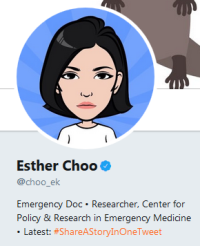How Academics Can Use Social Media to Advocate for Science and Policy
Guest: Esther Choo, MD
August 2, 12 p.m. ET
Dr. Esther Choo is an emergency physician and researcher at Oregon Health & Sciences University. She studies health disparities, substance use disorders, and gender bias. She has published more than 65 research manuscripts on substance use disorders, health disparities, gender bias, and emergency care. She has written on health topics for Quartz.com, KevinMD, and Huffington Post. She serves on the executive board of FeminEM.org and Women Physicians For Humanity, and started the #DoctorsSpeakOut project capturing the opinions of physicians about the Senate health care bill. She also created the #thatsbias hashtag to advance discussions of gender bias in medicine, and #codehate to raise awareness about racism in the healthcare setting.
Join Drs. Pagoto and Choo in a discussion around the following questions.
- Why should healthcare professionals and academics use social media to advocate for policy, science, or issues in their fields?
- Content is key in social media. Where do you find content to post? How do you decide what to post?
- Audience is key in social media. What are some strategies for building the target audience (e.g., colleagues, stakeholders, legislators, journalists)?
- When it comes to social media advocacy, how do you measure impact? How do you know if you are having impact?
- Academics often say they don’t have time for unpaid work like social media. How much time does it take and how do you make the time? Any time-saving tricks or tools?
Transcript link to share: http://wke.lt/w/s/99YOk


